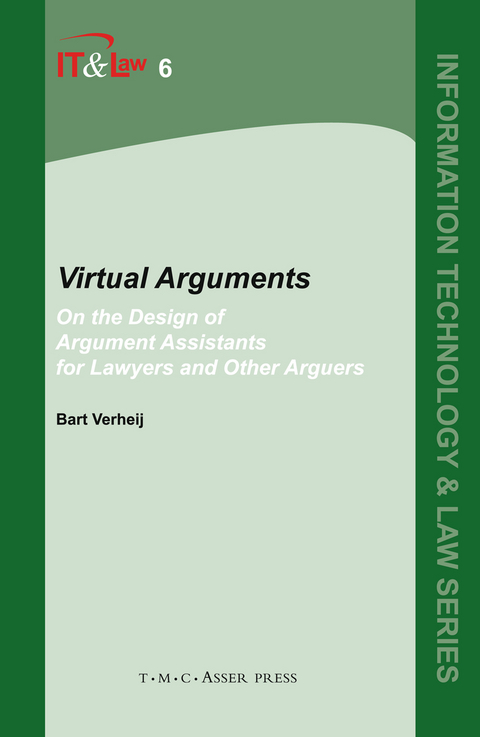
Virtual Arguments
On the Design of Argument Assistants for Lawyers and Other Arguers
Seiten
2005
T.M.C. Asser Press (Verlag)
978-90-6704-190-4 (ISBN)
T.M.C. Asser Press (Verlag)
978-90-6704-190-4 (ISBN)
He has given courses on, amongst others, legal reasoning, tort law, legal information technology and artificial intelligence.
This is Volume 6 in the Information Technology and Law (IT&Law) Series
Virtual Arguments' subject matter is argument assistance software. Whereas word-processing software assists in the writing and formatting of texts, argument assistance software supports argumentative tasks. Argument assistance software can for instance help with the organization, visualization and evaluation of arguments.
The focus of this book is on defeasible argumentation. Argumentation is defeasible when it is possible that conclusions are withdrawn in the light of further argumentation. The domain of application in this book is the law, where the defeasibility of argumentation is common and often essential.
The author’s approach is interdisciplinary. The book reports on current research in artificial intelligence, legal theory and argumentation theory. It is relevant for all those who are interested in defeasible argumentation, legal reasoning and argument assistance software. The book combines theoretical reflection with illustrativeexamples. As a result, it provides an intriguing outlook on the state of the art both for researchers and legal practitioners.
Bart Verheij is Assistant Professor at the Artificial Intelligence Department of the University of Groningen, The Netherlands. His research focuses on legal reasoning and defeasible argumentation. He has studied the logic of reasoning with legal rules and with legal cases. His investigation of argument defeat has resulted in the logical models CumulA and DefLog. He designed and implemented software for argumentation support (Argue! and ArguMed). He has given courses on, amongst others, legal reasoning, tort law, legal information technology and artificial intelligence.
This is Volume 6 in the Information Technology and Law (IT&Law) Series
This is Volume 6 in the Information Technology and Law (IT&Law) Series
Virtual Arguments' subject matter is argument assistance software. Whereas word-processing software assists in the writing and formatting of texts, argument assistance software supports argumentative tasks. Argument assistance software can for instance help with the organization, visualization and evaluation of arguments.
The focus of this book is on defeasible argumentation. Argumentation is defeasible when it is possible that conclusions are withdrawn in the light of further argumentation. The domain of application in this book is the law, where the defeasibility of argumentation is common and often essential.
The author’s approach is interdisciplinary. The book reports on current research in artificial intelligence, legal theory and argumentation theory. It is relevant for all those who are interested in defeasible argumentation, legal reasoning and argument assistance software. The book combines theoretical reflection with illustrativeexamples. As a result, it provides an intriguing outlook on the state of the art both for researchers and legal practitioners.
Bart Verheij is Assistant Professor at the Artificial Intelligence Department of the University of Groningen, The Netherlands. His research focuses on legal reasoning and defeasible argumentation. He has studied the logic of reasoning with legal rules and with legal cases. His investigation of argument defeat has resulted in the logical models CumulA and DefLog. He designed and implemented software for argumentation support (Argue! and ArguMed). He has given courses on, amongst others, legal reasoning, tort law, legal information technology and artificial intelligence.
This is Volume 6 in the Information Technology and Law (IT&Law) Series
Bart Verheij is Assistant Professor at the Artificial Intelligence Department of the University of Groningen
The First Prototype: ARGUE!.- Improved Naturalness: ARGUMED 2.0.- A Logical Extension: ARGUMED 3.0 based on DEFLOG.- A Comparison of Argument Assistants and Mediators.- Theories of Defeasible Argumentation.- Argument Assistants: Conclusions and Prospects.
| Erscheint lt. Verlag | 10.3.2005 |
|---|---|
| Reihe/Serie | Information Technology and Law Series ; 6 | Information Technology and Law Series ; 6 |
| Zusatzinfo | 272 p. |
| Verlagsort | The Hague |
| Sprache | englisch |
| Themenwelt | Geisteswissenschaften ► Philosophie ► Logik |
| Informatik ► Theorie / Studium ► Künstliche Intelligenz / Robotik | |
| Recht / Steuern ► EU / Internationales Recht | |
| Recht / Steuern ► Öffentliches Recht | |
| Recht / Steuern ► Privatrecht / Bürgerliches Recht ► Berufs-/Gebührenrecht | |
| Recht / Steuern ► Privatrecht / Bürgerliches Recht ► IT-Recht | |
| Recht / Steuern ► Privatrecht / Bürgerliches Recht ► Medienrecht | |
| ISBN-10 | 90-6704-190-4 / 9067041904 |
| ISBN-13 | 978-90-6704-190-4 / 9789067041904 |
| Zustand | Neuware |
| Haben Sie eine Frage zum Produkt? |
Mehr entdecken
aus dem Bereich
aus dem Bereich
Buch | Softcover (2024)
REDLINE (Verlag)
CHF 27,95
Eine kurze Geschichte der Informationsnetzwerke von der Steinzeit bis …
Buch | Hardcover (2024)
Penguin (Verlag)
CHF 39,20


